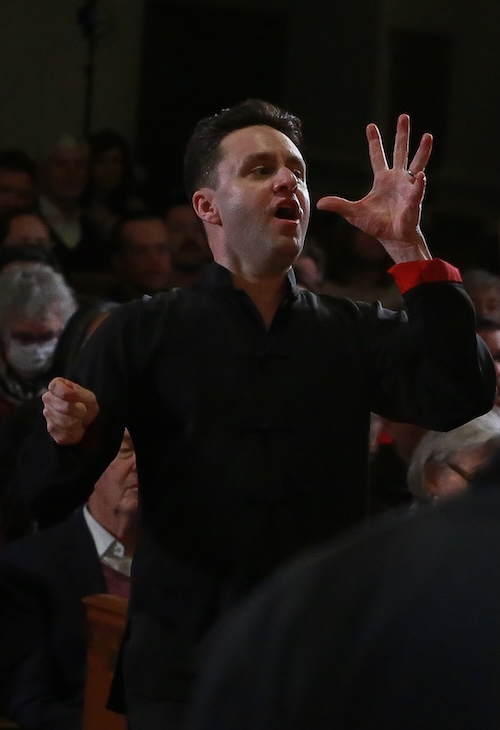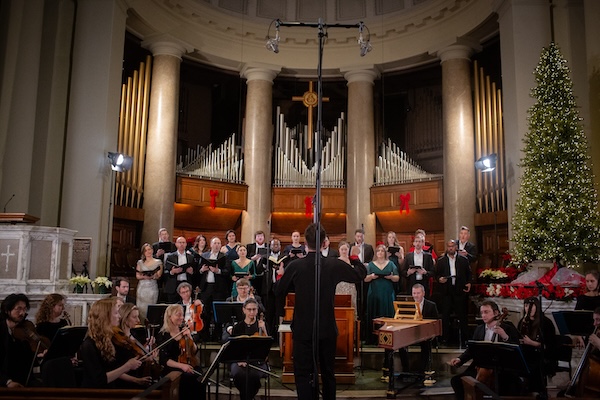Chorus members take the solo spotlight in The Thirteen’s “Messiah”

Matthew Robertson conducted The Thirteen in Handel’s Messiah Saturday night. Photo: Becky Oehlers
To stand out in the crowded Messiah marketplace, it helps to have an angle. You can do George Frederick Handel’s greatest hit with lots of musicians, hardly any musicians, period instruments, anachronistic orchestration, and the audience singing along, among others.
At National City Christian Church on Saturday night, Matthew Robertson, artistic director of The Thirteen, departed from the norm by featuring 16 of the choir’s 20 vocalists as soloists. (As the group has evolved, the name “The Thirteen” has become more a concept than a mathematical limit.) Robertson’s choirs are always top-notch, so the result was a feast of distinctive approaches to these famous arias, plus dazzling choruses when all the vocalists sang together.
The Thirteen chorus displayed perfect diction in even the densest contrapuntal thickets. High or low, loud or soft, the choral music sounded clear and vibrant. They created eerie, haunting dissonances in “Since by man came death,” and they sounded like a ray of sunlight in “Glory to God.” The opening of “All we like sheep” bounced merrily, and the words “the iniquity of us all” at the end sounded especially forlorn in contrast, a transition Robertson managed expertly.
As artistic director, Robertson assembled a fine period orchestra for this performance, with valveless trumpets and a crackerjack continuo section featuring organist Elliott Figg and harpsichordist Adam Pearl. As conductor, he kept the music moving while giving it room to breathe, and the rhythms were buoyant throughout the ensemble. Robertson also paid keen attention to dynamics; the buzzing strings that accompany the words “For he is like a refiner’s fire” sounded even more scorching than usual with the sudden swells and contractions of volume on Saturday.

Photo: Becky Oehlers
In “The people that walked in darkness,” bass-baritone Steve Hrycelak adeptly shaded his vocal colors to emphasize the contrast between “a great light” and “the shadow of death.” Countertenor Patrick Dailey used the transition between his middle and high voice to exciting effect in “O thou that tellest” when he pushed up to “the high mountain,” festooning the melody with exciting ornamentation along the way. Soprano Madeline Healey’s clear, ringing voice soared in the sequence beginning with “There were shepherds” before an infectious “Rejoice greatly.”
Mezzo Aryssa Leigh Burrs eschewed histrionics in “He was despised,” opting for an understated approach that gained impact from her radiant voice and heartbreaking ornaments in the repeat. Baritone Steven Eddy made Handel’s notorious vocal runs work for him in “Why do the nations,” sounding all the more commanding as his voice remained rock-solid throughout.
Soprano Andréa Walker’s “I know that my Redeemer liveth” unspooled like a luminous ribbon, climaxing in the last line “the first fruits of them that sleep,” with the word “fruits” floating high and ethereal and getting that little extra push from a well-judged ornament. And while bass-baritone Charles Wesley Evans seemed to be battling a cold in “The trumpet shall sound,” trumpeter Josh Cohen shone with a robust tone and some brilliant riffs on the melody.
The audience stood for the “Hallelujah” chorus, another spot where Robertson’s attention to dynamics helped heighten the impact, but the climax of this Messiah came at the end, with a searching rendition of the “Amen.” As the strings took over the melody midway through, they seemed to float through the sudden stillness; when the chorus, trumpets, and timpani burst back in, the sound filled the church from top to bottom. It was a fitting close to an evening where the chorus was the star, even during the solos.
The Thirteen will repeat Handel’s Messiah 5 p.m. Sunday at the Bradley Hills Presbyterian Church in Bethesda. thethirteenchoir.org
